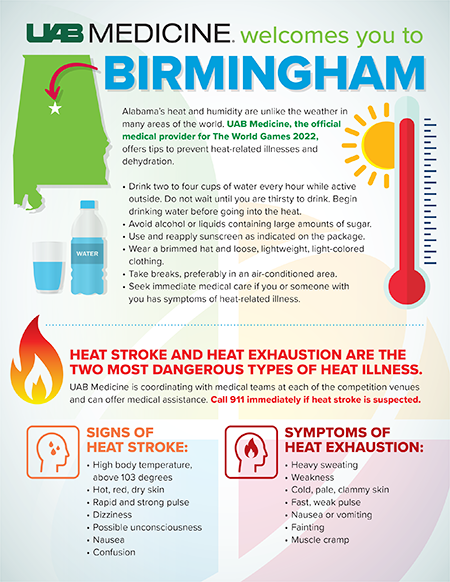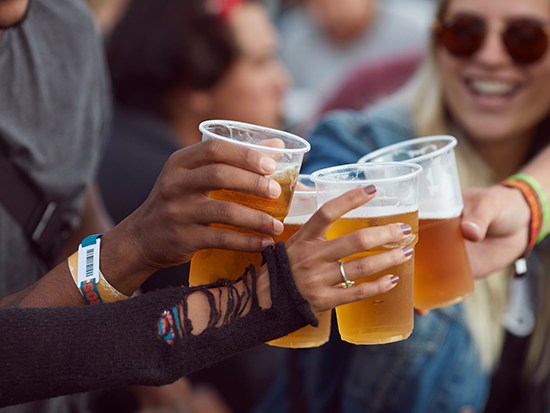By Savannah Koplon
UAB News
Warm weather makes people want to be outside, congregate with friends and grab an adult beverage from the cooler as a refreshment. With The World Games taking place in Birmingham in the middle of summer, for many a leisurely day of watching sports may lend itself to having a few alcoholic drinks. But paired with the extreme Alabama heat and humidity, excessive alcohol intake can lead to significant health concerns, like severe dehydration and even hospitalization if not monitored.
University of Alabama at Birmingham experts provide tips on how to stay aware, safe and hydrated when attending major sporting events in our area, particularly concerning the consumption of alcohol when outdoors under the strong July sun.
Hydration with alcohol = dehydration
Alabama in July can be hot and humid. Grabbing a cold beer or making a cold alcoholic beverage may make a person feel as though they are hydrating; but that false sense of security could actually dehydrate a person instead, which can lead to negative effects like alcohol poisoning or becoming unconscious.
“It is tempting to want to cool off with an adult refreshment; but in temperatures like we see here in Alabama, it not only creates a false sense of hydration for folks but simultaneously causes quick onset feelings like impairment and disorientation, which can be amplified quickly by the sun,” said Sarah Nafziger, M.D., vice president for Clinical Support Services at UAB Hospital.
“We certainly want people to enjoy themselves when visiting different events in our city the next few days, but it’s important to not get carried away with drinking too much alcohol.”
As people feel thirstier, they may reach for another alcoholic drink rather than alternating with a hydrating drink like plain water. What is more, continuous consumption of alcoholic beverages can make someone feel fuller faster without supplementing food and/or water to actually keep them nourished.
“Alcohol notoriously can make someone feel full, but we really caution people to not mistake feeling full and having fun with signs of dehydration and eating proper filling meals,” Nafziger urged. “We really want people who are visiting Birmingham and checking out all that The World Games has to offer to not get carried away with binge drinking or not keeping tabs on how truly warm the weather will be.”
Per the National Institute on Alcohol Abuse and Alcoholism, binge drinking is categorized by four drinks in two hours for women and five drinks in two hours for men; a standard drink is a 12-ounce beer, 8 ounces of malt liquor, a 5-ounce glass of wine or a 1.5-ounce shot of liquor.
If a person finds themselves drinking in excess, alcohol poisoning could occur. Signs of alcohol poisoning include:
- Confusion
- Vomiting
- Seizures
- Slow breathing
- Irregular breathing
 To combat the potential harms of alcohol consumption and hot temperatures, drinking enough fluids is one of the most important things one can do to prevent heat-related illness and dehydration, according to Ksenia Blinnikova, M.D., an assistant professor in the UAB Department of Family and Community Medicine. She notes that an easy way to continue to alternate and include water in one’s routine in the heat is to carry a bottle of water with them everywhere they go.
To combat the potential harms of alcohol consumption and hot temperatures, drinking enough fluids is one of the most important things one can do to prevent heat-related illness and dehydration, according to Ksenia Blinnikova, M.D., an assistant professor in the UAB Department of Family and Community Medicine. She notes that an easy way to continue to alternate and include water in one’s routine in the heat is to carry a bottle of water with them everywhere they go.
“An easy rule of thumb is to drink 1 milliliter of fluids for every calorie consumed,” Blinnikova said. “In other words, if you eat 2,000 calories per day, then you should drink 2,000 milliliters of fluids per day, which equals 68 ounces. To help you determine the exact amount you should be drinking per day, I recommend talking with your primary care provider.”
For those who do not enjoy drinking plain water, Blinnikova says drinking flavored or sparkling water with flavoring additives is also a way to stay hydrated.
Just like alternating alcoholic drinks with water to maintain hydration, Blinnikova notes that it is important to steer from caffeinated beverages and beverages with added sugar that only add extra dehydration risks to the mix.
Recognize heat illness before it strikes
In addition to looking out for signs of dehydration, medical providers say to stay hydrated, keep cool and be aware of the signs of heat illness. When consuming alcoholic drinks, knowing the signs of heat illness in oneself and their friends is more important than ever.
“The body uses sweating to cool itself; but with extreme temperatures, high humidity and a high heat index, body temperature can rise to dangerous levels,” said Marie-Carmelle Elie, M.D., chair of the Department of Emergency Medicine in the UAB Marnix E. Heersink School of Medicine. “Older adults, young children and those with preexisting conditions are at highest risk; but anyone can develop heat-related illnesses under the right conditions.”
Signs of heat stroke include:
- High body temperature, above 103 degrees
- Hot, red, dry skin
- Rapid and strong pulse
- Dizziness
- Possible unconsciousness
- Nausea
- Confusion
Symptoms of heat exhaustion are:
- Heavy sweating
- Weakness
- Cold, pale, clammy skin
- Fast, weak pulse
- Nausea or vomiting
- Fainting
- Muscle cramp
“Heat stroke and heat exhaustion are the two most dangerous conditions,” Elie said. “Heat stroke is a medical emergency — call 911 immediately if heat stroke is suspected. For heat exhaustion, reduce the person’s body temperature with cool cloths or even a bath, but do not give fluids.




